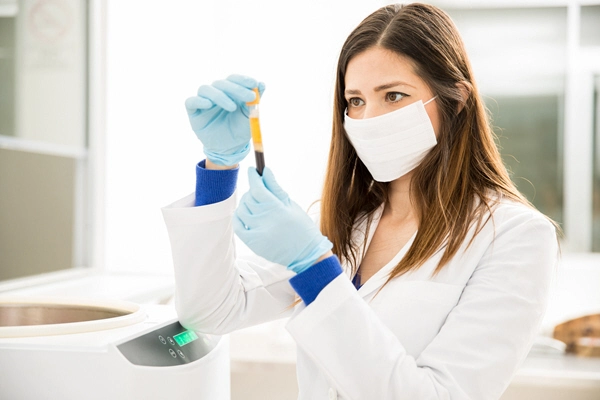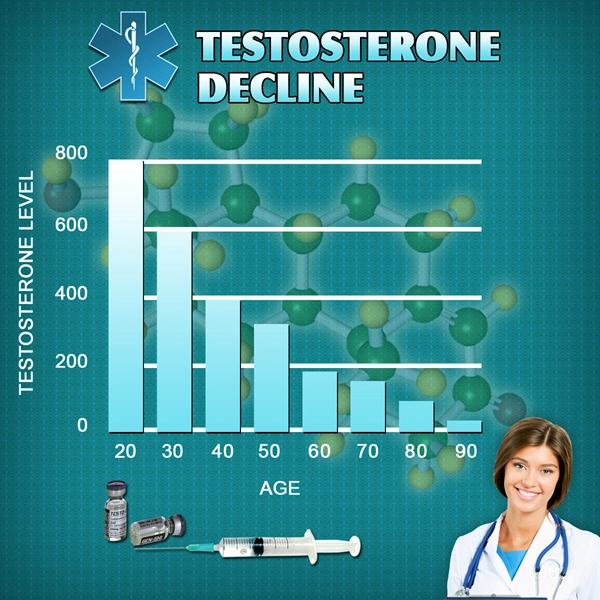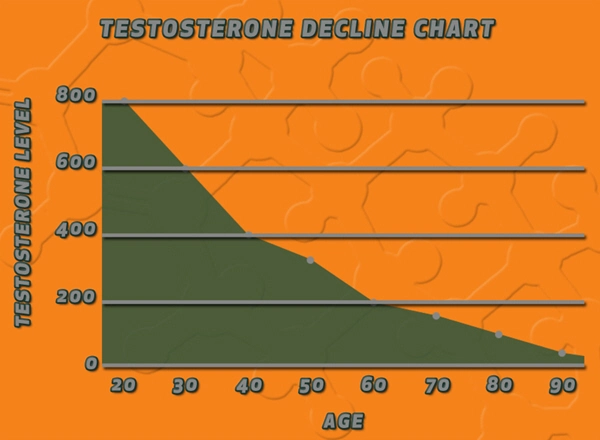Introduction
Sleep is a fundamental aspect of human health, influencing various physiological processes, including hormonal regulation. Among the hormones affected by sleep, testosterone plays a crucial role in male health, impacting muscle mass, bone density, and overall well-being. Recent studies have begun to explore the relationship between sleep deprivation and testosterone levels in American males, revealing significant implications for health and lifestyle. This article delves into the findings of a prospective study on the impact of sleep deprivation on testosterone levels, offering insights into hormonal regulation and its broader effects on men's health.
The Study on Sleep Deprivation and Testosterone
A prospective study conducted on a cohort of American males aged 20 to 50 years examined the effects of sleep deprivation on testosterone levels. Participants were divided into two groups: one maintaining a regular sleep schedule of 7-9 hours per night, and the other subjected to chronic sleep restriction, averaging 5 hours per night. Over a period of one month, blood samples were collected to measure testosterone levels at regular intervals.
The results were striking. Men in the sleep-restricted group exhibited a significant decrease in testosterone levels compared to those who adhered to a regular sleep schedule. Specifically, testosterone levels dropped by an average of 10-15% in the sleep-deprived group, highlighting a direct correlation between sleep duration and hormonal balance.
Mechanisms Behind the Impact of Sleep on Testosterone
The mechanisms through which sleep deprivation affects testosterone levels are multifaceted. One primary pathway involves the disruption of the body's circadian rhythm, which regulates the release of hormones, including testosterone. Sleep deprivation can lead to an imbalance in the secretion of luteinizing hormone (LH), which is essential for testosterone production. Additionally, sleep loss increases cortisol levels, a stress hormone that can inhibit testosterone synthesis.
Furthermore, sleep is crucial for the restorative processes that occur during the night, such as tissue repair and muscle growth, both of which are influenced by testosterone. Chronic sleep deprivation can impair these processes, leading to a decline in testosterone levels over time.
Implications for American Males
The findings of this study have significant implications for American males, particularly in a society where sleep deprivation is increasingly common due to work demands, lifestyle choices, and technology use. Low testosterone levels can lead to a range of health issues, including reduced muscle mass, decreased bone density, fatigue, and mood disturbances. For men already experiencing symptoms of low testosterone, such as those in middle age, the impact of sleep deprivation can exacerbate these conditions.
Moreover, the study underscores the importance of prioritizing sleep as part of a healthy lifestyle. American males are encouraged to aim for 7-9 hours of quality sleep per night to maintain optimal testosterone levels and overall health. This recommendation aligns with guidelines from health organizations, emphasizing the role of sleep in preventing chronic diseases and promoting longevity.
Strategies for Improving Sleep Quality
To mitigate the effects of sleep deprivation on testosterone levels, American males can adopt several strategies to improve sleep quality. Establishing a regular sleep schedule, creating a restful sleep environment, and limiting exposure to screens before bedtime are effective ways to enhance sleep. Additionally, engaging in regular physical activity and managing stress through mindfulness or relaxation techniques can further support healthy sleep patterns.
Conclusion
The prospective study on the impact of sleep deprivation on testosterone levels in American males provides compelling evidence of the critical role sleep plays in hormonal regulation. By understanding the mechanisms behind this relationship and implementing strategies to improve sleep quality, men can safeguard their testosterone levels and overall health. As sleep continues to be a cornerstone of well-being, it is imperative for American males to prioritize rest as part of a comprehensive approach to health and vitality.

- Unlocking Vigor: Testosterone, The Quintessential Powering Force of Masculinity [Last Updated On: February 25th, 2025] [Originally Added On: February 25th, 2025]
- Hormonal Harmony: The Orchestra Conductor of Life - Testosterone [Last Updated On: February 26th, 2025] [Originally Added On: February 26th, 2025]
- A Chronological Expedition: Testosterone's Mysterious and Pivotal Voyage Across Human History [Last Updated On: February 27th, 2025] [Originally Added On: February 27th, 2025]
- The Unseen Power: Unveiling the Unsuspected Advantages of Robust Testosterone Levels [Last Updated On: February 28th, 2025] [Originally Added On: February 28th, 2025]
- Demystifying Testosterone: A Comprehensive Exploration of Fact and Fiction [Last Updated On: February 28th, 2025] [Originally Added On: February 28th, 2025]
- Harnessing the Vigor of Life: Decoding the Influence of Testosterone [Last Updated On: March 1st, 2025] [Originally Added On: March 1st, 2025]
- Exploring Nutritional Strategies for Testosterone Enhancement [Last Updated On: March 2nd, 2025] [Originally Added On: March 2nd, 2025]
- Enhancing Testosterone Levels Through Exercise: Mechanisms, Types of Exercises, and Age-Related Considerations [Last Updated On: March 3rd, 2025] [Originally Added On: March 3rd, 2025]
- Understanding Testosterone's Role in Cognitive Function and Mood [Last Updated On: March 4th, 2025] [Originally Added On: March 4th, 2025]
- Unveiling the Vital Role of Testosterone in Women's Health: A Comprehensive Overview [Last Updated On: March 4th, 2025] [Originally Added On: March 4th, 2025]
- Understanding Testosterone's Role in Male Health and Reproductive Function [Last Updated On: March 5th, 2025] [Originally Added On: March 5th, 2025]
- Genetics and Testosterone: Predestined Levels or Modifiable by Lifestyle? [Last Updated On: March 5th, 2025] [Originally Added On: March 5th, 2025]
- Testosterone's Crucial Role in Male Development and Health Across Lifespan [Last Updated On: March 6th, 2025] [Originally Added On: March 6th, 2025]
- Optimizing Testosterone Levels: Lifestyle Strategies for Health and Vitality [Last Updated On: March 7th, 2025] [Originally Added On: March 7th, 2025]
- Optimizing Men's Health: Advances in Testosterone Replacement Therapy and Personalized Approaches [Last Updated On: March 8th, 2025] [Originally Added On: March 8th, 2025]
- Managing Testosterone Decline in Men: Strategies for Health and Vitality as You Age [Last Updated On: March 9th, 2025] [Originally Added On: March 9th, 2025]
- Unveiling the Nightly Ritual: How Sleep Boosts Testosterone in American Men [Last Updated On: March 12th, 2025] [Originally Added On: March 12th, 2025]
- Unlocking the Potential of Testosterone: Pioneering Advances in Hormonal Health for American Males [Last Updated On: March 13th, 2025] [Originally Added On: March 13th, 2025]
- Unraveling the Interplay of Stress, Cortisol, and Testosterone: A Guide to Hormonal Harmony for American Males [Last Updated On: March 13th, 2025] [Originally Added On: March 13th, 2025]
- Unleashing Potential: The Role of Testosterone in Athletic Performance Among American Males [Last Updated On: March 15th, 2025] [Originally Added On: March 15th, 2025]
- Testosterone's Impact on Metabolism and Fat Burning in American Males [Last Updated On: March 18th, 2025] [Originally Added On: March 18th, 2025]
- Boosting Testosterone: Supplements, Herbs, Diet, and Exercise Strategies for American Males [Last Updated On: March 18th, 2025] [Originally Added On: March 18th, 2025]
- Testosterone's Impact on Heart Health in American Men: Risks, Therapy, and Lifestyle [Last Updated On: March 18th, 2025] [Originally Added On: March 18th, 2025]
- Testosterone's Crucial Role in Maintaining Bone Density in American Males [Last Updated On: March 19th, 2025] [Originally Added On: March 19th, 2025]
- Testosterone's Role in Enhancing Workplace Productivity and Cognitive Function [Last Updated On: March 19th, 2025] [Originally Added On: March 19th, 2025]
- Testosterone's Role in Male Libido: Strategies for Enhancing Sexual Health [Last Updated On: March 19th, 2025] [Originally Added On: March 19th, 2025]
- Low Testosterone in Men: Causes, Symptoms, and Effective Treatment Options [Last Updated On: March 20th, 2025] [Originally Added On: March 20th, 2025]
- Environmental Toxins and Their Impact on Testosterone Levels in American Males [Last Updated On: March 20th, 2025] [Originally Added On: March 20th, 2025]
- Testosterone's Impact on Mood, Memory, and Motivation in American Males [Last Updated On: March 21st, 2025] [Originally Added On: March 21st, 2025]
- Testosterone's Role in Immune Health and Protection in American Males [Last Updated On: March 21st, 2025] [Originally Added On: March 21st, 2025]
- Achieving Hormonal Harmony: Testosterone's Interplay in Men's Health [Last Updated On: March 22nd, 2025] [Originally Added On: March 22nd, 2025]
- Meditation's Impact on Testosterone Levels in American Males: Benefits and Practices [Last Updated On: March 22nd, 2025] [Originally Added On: March 22nd, 2025]
- Resistance Training Boosts Testosterone: Benefits and Strategies for American Males [Last Updated On: March 22nd, 2025] [Originally Added On: March 22nd, 2025]
- Navigating Testosterone Concerns: Preparation, Communication, and Management Strategies [Last Updated On: March 22nd, 2025] [Originally Added On: March 22nd, 2025]
- Optimal Testosterone Levels: Importance, Monitoring, and Natural Enhancement Strategies for American Males [Last Updated On: March 22nd, 2025] [Originally Added On: March 22nd, 2025]
- Testosterone's Role in Enhancing Cardiovascular Health in American Males [Last Updated On: March 23rd, 2025] [Originally Added On: March 23rd, 2025]
- Andropause: Understanding Male Menopause and Testosterone Decline in American Men [Last Updated On: March 23rd, 2025] [Originally Added On: March 23rd, 2025]
- Urban vs. Rural Living: Impacts on Testosterone Levels in American Males [Last Updated On: March 23rd, 2025] [Originally Added On: March 23rd, 2025]
- Testosterone Monitoring: Empowering Men with Health Apps and Wearables [Last Updated On: March 23rd, 2025] [Originally Added On: March 23rd, 2025]
- Intermittent Fasting: A Promising Method to Boost Testosterone in American Males [Last Updated On: March 24th, 2025] [Originally Added On: March 24th, 2025]
- Testosterone's Impact on Ambition and Competitiveness in American Men [Last Updated On: March 24th, 2025] [Originally Added On: March 24th, 2025]
- Testosterone Revolution: Redefining Masculinity and Health in the 21st Century [Last Updated On: March 24th, 2025] [Originally Added On: March 24th, 2025]
- Testosterone's Role in Muscle Recovery for American Males: Strategies and Insights [Last Updated On: March 24th, 2025] [Originally Added On: March 24th, 2025]
- Testosterone's Impact on Mental Health and Cognitive Function in American Men [Last Updated On: March 25th, 2025] [Originally Added On: March 25th, 2025]
- Boosting Testosterone: Diet, Exercise, Sleep, and Stress Management for American Males [Last Updated On: March 25th, 2025] [Originally Added On: March 25th, 2025]
- Hormonal Health for American Males: Understanding and Boosting Testosterone Levels [Last Updated On: March 25th, 2025] [Originally Added On: March 25th, 2025]
- Social Interactions Impact Testosterone Levels in American Males: Health Implications [Last Updated On: March 25th, 2025] [Originally Added On: March 25th, 2025]
- Testosterone's Role in Longevity: Insights for American Males [Last Updated On: March 25th, 2025] [Originally Added On: March 25th, 2025]
- Testosterone's Crucial Role in Enhancing Mental Resilience in American Men [Last Updated On: March 25th, 2025] [Originally Added On: March 25th, 2025]
- Music and Art Boost Testosterone in American Men: A Holistic Approach [Last Updated On: March 25th, 2025] [Originally Added On: March 25th, 2025]
- Testosterone Management for American Males: Lifestyle, Diet, and Medical Insights [Last Updated On: March 25th, 2025] [Originally Added On: March 25th, 2025]
- Boosting Testosterone: The Vital Role of Outdoor Activities for American Males [Last Updated On: March 26th, 2025] [Originally Added On: March 26th, 2025]
- Positivity Boosts Testosterone: Strategies for American Men's Hormonal Health [Last Updated On: March 26th, 2025] [Originally Added On: March 26th, 2025]
- Testosterone's Impact on Sleep: Strategies for American Males to Enhance Rest [Last Updated On: March 26th, 2025] [Originally Added On: March 26th, 2025]
- Boost Testosterone Naturally: Effective Home Workouts with Resistance Bands [Last Updated On: March 26th, 2025] [Originally Added On: March 26th, 2025]
- Modern American Diets and Their Impact on Men's Testosterone Levels: Strategies for Optimization [Last Updated On: March 26th, 2025] [Originally Added On: March 26th, 2025]
- Managing Testosterone Levels in American Males with Chronic Diseases: A Holistic Approach [Last Updated On: March 26th, 2025] [Originally Added On: March 26th, 2025]
- Testosterone's Impact on Body Image and Self-Esteem in American Males [Last Updated On: March 26th, 2025] [Originally Added On: March 26th, 2025]
- Testosterone Replacement Therapy: Benefits, Risks, and Long-Term Considerations for Men [Last Updated On: March 26th, 2025] [Originally Added On: March 26th, 2025]
- Personalized Testosterone Therapy: Tailoring Treatment to Genetic Profiles for American Men [Last Updated On: March 26th, 2025] [Originally Added On: March 26th, 2025]
- Testosterone's Influence on Risk-Taking in American Men: Biological and Cultural Insights [Last Updated On: March 27th, 2025] [Originally Added On: March 27th, 2025]
- Optimizing Testosterone: Sleep, Nutrition, Exercise, and Lifestyle for American Men's Health [Last Updated On: March 27th, 2025] [Originally Added On: March 27th, 2025]
- Testosterone's Impact on Cognitive Function in American Males: Insights and Implications [Last Updated On: March 27th, 2025] [Originally Added On: March 27th, 2025]
- Optimizing Testosterone with Vitamins D, Zinc, Magnesium, and K2 in American Males [Last Updated On: March 28th, 2025] [Originally Added On: March 28th, 2025]
- Economic Impact of Low Testosterone: Healthcare Costs, Productivity Loss, and Societal Burden [Last Updated On: March 28th, 2025] [Originally Added On: March 28th, 2025]
- Declining Testosterone in American Males: Trends, Causes, and Health Strategies [Last Updated On: March 28th, 2025] [Originally Added On: March 28th, 2025]
- Gut Health's Impact on Testosterone: A Guide for American Males [Last Updated On: March 29th, 2025] [Originally Added On: March 29th, 2025]
- Testosterone Research Evolution: From Lab Discoveries to Clinical Impacts on Men's Health [Last Updated On: March 30th, 2025] [Originally Added On: March 30th, 2025]
- Testosterone in Sports: Myths, Facts, and Future Research for American Males [Last Updated On: March 30th, 2025] [Originally Added On: March 30th, 2025]
- Testosterone's Impact on Male Skin, Hair Health, and Management Strategies [Last Updated On: March 31st, 2025] [Originally Added On: March 31st, 2025]
- Emerging Technologies Revolutionize Testosterone Optimization in Men's Health [Last Updated On: March 31st, 2025] [Originally Added On: March 31st, 2025]
- Testosterone's Impact on Immune Health: Insights for American Men's Well-being [Last Updated On: March 31st, 2025] [Originally Added On: March 31st, 2025]
- Alcohol and Smoking: Impacts on Testosterone Levels in American Males [Last Updated On: April 2nd, 2025] [Originally Added On: April 2nd, 2025]
- Testosterone's Crucial Role in Men's Sexual Health and Well-being [Last Updated On: April 3rd, 2025] [Originally Added On: April 3rd, 2025]
- Body Composition and Testosterone: A Guide for American Males' Health Optimization [Last Updated On: April 5th, 2025] [Originally Added On: April 5th, 2025]
- Mindfulness Boosts Testosterone: Meditation, Yoga, and Lifestyle for American Men's Health [Last Updated On: April 5th, 2025] [Originally Added On: April 5th, 2025]
- Testosterone's Role in Social Dominance Among American Males: Evolutionary and Modern Insights [Last Updated On: April 8th, 2025] [Originally Added On: April 8th, 2025]
- Seasonal Testosterone Fluctuations: Impact and Management Strategies for American Males [Last Updated On: April 8th, 2025] [Originally Added On: April 8th, 2025]
- Acupuncture's Role in Enhancing Testosterone Levels for American Males [Last Updated On: April 9th, 2025] [Originally Added On: April 9th, 2025]
- HIIT Boosts Testosterone: A Guide for American Males [Last Updated On: April 9th, 2025] [Originally Added On: April 9th, 2025]



List of USA state clinics - click a flag below for blood testing clinics.
Word Count: 615


















































